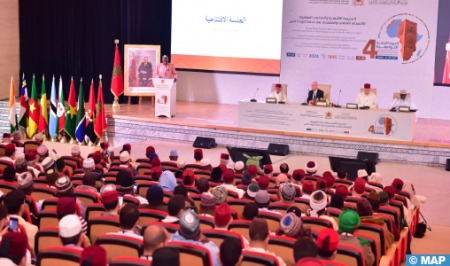
Doctrinal concordance between Morocco and African countries is a guarantee of peace and security between their peoples, the Minister of Endowments and Islamic Affairs, Ahmed Toufiq, said Tuesday in Rabat.
Speaking at the opening of the 4th communication session of the Mohammed VI Foundation of African Ulema, Toufiq explained that the doctrine plays an important role in guaranteeing security and spiritual peace in that it allows immunize the believer against confusion and discord.
The agenda for this two-day gathering includes lectures on Achaari dogma, the preservation of religious necessities and objectives, as well as jurisprudential rites’ genesis, origins, and extensions.
Toufiq noted that the theme of this event, “the Ashaari school and the rites: scientific and methodological coherence to serve the needs of religion”, confirms the common doctrinal and spiritual belonging between Morocco and African countries.
This theme is also of great importance because it focuses on one of the major Islamic references which provides clear answers to urgent questions, he added, stressing that the doctrine is a way of life which rhythms the daily experience of the individual.
Toufiq presented the Foundation’s roadmap for this year, which notably includes the development of a guide for Mourchidines and Mourchidates in African countries, and explained that the aim is to promote science and knowledge and Islamic thought, and provide a guide to Sufi practices, in partnership with imams and ulema.
He highlighted further the particular importance of the Charter of the Mohammed VI Foundation of African Ulema, which aims to promote good morality and fight against disruptive currents.
For his part, the Secretary General of the Supreme Ulema Council, Mohamed Yssef, emphasized the importance of this meeting, which is being held in parallel with the Ramadan religious lectures chaired by King Mohammed VI, Commander of the Faithful, because it addresses the question of schools and standards governing Islam in Africa. These rites cement the links between sub-Saharan Ulema and the Kingdom of Morocco, he said.
Mohamed Yssef underlined that “Morocco is a pioneering country in terms of organizing this type of meetings, since the 1st conference of African Ulema was held, under the presidency of the late king Mohammed V,” noting that the concordance between Moroccan and African Ulema was essentially aimed at serving the liberation efforts made by African leaders throughout history.
Representatives of sections of the Mohammed VI Foundation of African Ulemas from several countries, including from Gambia and Zambi, who took part in the 4th scientific communication session praised the efforts made by King Mohammed VI to promote a peaceful, moderate, and middle-ground Islam.
They emphasized Morocco’s role in countering misconceptions of Islam, suggesting that Africa should draw inspiration from the Moroccan religious model, fostering greater unity through federating initiatives.
The participants also commended the Foundation’s solidarity initiatives benefiting the elderly, the underprivileged, and individuals with special needs, especially during Ramadan.
As put by Sheikh Moustapha Sonta, Khalif General of the Tijānī in Côte d’Ivoire, Africa is witnessing a remarkable shift with the advancement of an Islam advocating peace, moderation and middle-ground, spearheaded by the King.
